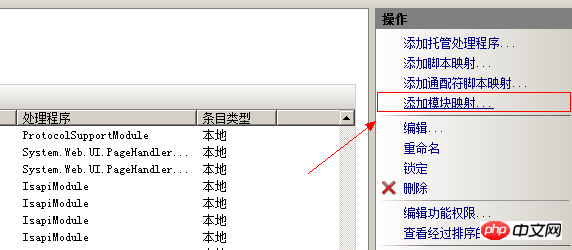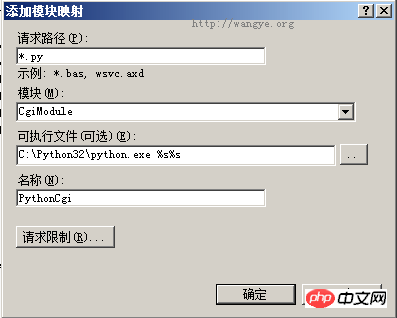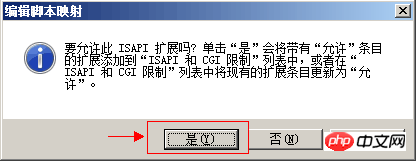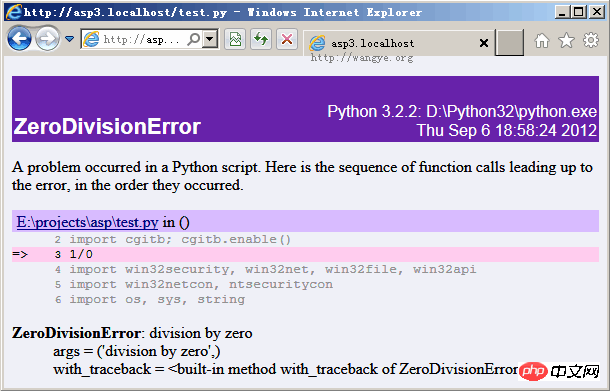 Backend Development
Backend Development
 Python Tutorial
Python Tutorial
 Share an example tutorial on running Python scripts using CGI on IIS
Share an example tutorial on running Python scripts using CGI on IIS
Share an example tutorial on running Python scripts using CGI on IIS
This article mainly introduces the tutorial of running Python scripts in CGI mode on IIS server. Although the performance of IIS is not ideal... Friends who need it can refer to it
Due to exposure to Python Web development , I just happened to study the simplest CGI method. It is really troublesome to configure Python for web development under Windows, but it is quite easy to configure under Linux. Microsoft happened to have a technical article "Using Python Scripts" with IIS" introduces these contents. This article introduces two methods. One is to use the ASP engine to run Python scripts. This may require the use of ActivePython. Of course, ASP technology is outdated. I will simply do it today. Introduce how the CGI module operates.
Write a simple Python script that supports CGI (this article introduces version 3.2 of Python):
print("Status: 200 OK")
print("Content-type: text/html")
print() # 打印一行空白行,用于分隔HTTP Header和正文
print("<h1>Hello World!</h1>")That’s it. You can guess that CGI redirects the standard output stream to HTTP output Stream to realize web page or data transmission.
Of course this cannot be run directly in IIS. We need to configure it, open the Internet Information Services (IIS) manager interface and select "Handler Mapping".

#Select "Add Module Mapping" on the right side of the next interface.
IIS7 Add module mapping

Assume that our Python 3.2 is installed in C:\Python32, then you can go down Fill in the picture like this:

Then click OK and select "Yes" in the dialog box that appears next.

Okay, our configuration is complete, restart IIS, and then try the code just now. Some people may complain that it is more troublesome to debug errors when writing web pages using CGI. For example, the following error is reported:
HTTP Error 502.2 - Bad Gateway
The specified CGI application did not return a complete A set of HTTP headers that produce erroneous behavior. The actual header it returns is "Traceback (most recent call last): File "E:\projects\test.py", line 3, in
In fact, we only need to introduce import cgitb; cgitb.enable() at the beginning, just like the following:
import cgitb; cgitb.enable()
print("Status: 200 OK")
print("Content-type: text/html")
print() # 打印一行空白行,用于分隔HTTP Header和正文
print("<h1>Hello World!</h1>")In this way, if an error occurs, the error will be reported in a friendly way Output.

For form processing, you can refer to the import cgi module (cgi.FieldStorage). There are many introductions to this on the Internet, so I won’t go into details. Enjoy it!
【Related recommendations】
1. Detailed explanation of cgi writing data example code to text or database
2 . What is CGI? Detailed introduction to Python CGI programming
3. Using CGI module to create a simple web page tutorial example
4. Share an example tutorial of PythonCGI programming
5. Detailed sample code explaining XML and modern CGI applications
6. FastCGI process unexpectedly exited causing 500 error
The above is the detailed content of Share an example tutorial on running Python scripts using CGI on IIS. For more information, please follow other related articles on the PHP Chinese website!

Hot AI Tools

Undresser.AI Undress
AI-powered app for creating realistic nude photos

AI Clothes Remover
Online AI tool for removing clothes from photos.

Undress AI Tool
Undress images for free

Clothoff.io
AI clothes remover

Video Face Swap
Swap faces in any video effortlessly with our completely free AI face swap tool!

Hot Article

Hot Tools

Notepad++7.3.1
Easy-to-use and free code editor

SublimeText3 Chinese version
Chinese version, very easy to use

Zend Studio 13.0.1
Powerful PHP integrated development environment

Dreamweaver CS6
Visual web development tools

SublimeText3 Mac version
God-level code editing software (SublimeText3)

Hot Topics
 PHP and Python: Different Paradigms Explained
Apr 18, 2025 am 12:26 AM
PHP and Python: Different Paradigms Explained
Apr 18, 2025 am 12:26 AM
PHP is mainly procedural programming, but also supports object-oriented programming (OOP); Python supports a variety of paradigms, including OOP, functional and procedural programming. PHP is suitable for web development, and Python is suitable for a variety of applications such as data analysis and machine learning.
 Choosing Between PHP and Python: A Guide
Apr 18, 2025 am 12:24 AM
Choosing Between PHP and Python: A Guide
Apr 18, 2025 am 12:24 AM
PHP is suitable for web development and rapid prototyping, and Python is suitable for data science and machine learning. 1.PHP is used for dynamic web development, with simple syntax and suitable for rapid development. 2. Python has concise syntax, is suitable for multiple fields, and has a strong library ecosystem.
 Python vs. JavaScript: The Learning Curve and Ease of Use
Apr 16, 2025 am 12:12 AM
Python vs. JavaScript: The Learning Curve and Ease of Use
Apr 16, 2025 am 12:12 AM
Python is more suitable for beginners, with a smooth learning curve and concise syntax; JavaScript is suitable for front-end development, with a steep learning curve and flexible syntax. 1. Python syntax is intuitive and suitable for data science and back-end development. 2. JavaScript is flexible and widely used in front-end and server-side programming.
 Can visual studio code be used in python
Apr 15, 2025 pm 08:18 PM
Can visual studio code be used in python
Apr 15, 2025 pm 08:18 PM
VS Code can be used to write Python and provides many features that make it an ideal tool for developing Python applications. It allows users to: install Python extensions to get functions such as code completion, syntax highlighting, and debugging. Use the debugger to track code step by step, find and fix errors. Integrate Git for version control. Use code formatting tools to maintain code consistency. Use the Linting tool to spot potential problems ahead of time.
 PHP and Python: A Deep Dive into Their History
Apr 18, 2025 am 12:25 AM
PHP and Python: A Deep Dive into Their History
Apr 18, 2025 am 12:25 AM
PHP originated in 1994 and was developed by RasmusLerdorf. It was originally used to track website visitors and gradually evolved into a server-side scripting language and was widely used in web development. Python was developed by Guidovan Rossum in the late 1980s and was first released in 1991. It emphasizes code readability and simplicity, and is suitable for scientific computing, data analysis and other fields.
 Is the vscode extension malicious?
Apr 15, 2025 pm 07:57 PM
Is the vscode extension malicious?
Apr 15, 2025 pm 07:57 PM
VS Code extensions pose malicious risks, such as hiding malicious code, exploiting vulnerabilities, and masturbating as legitimate extensions. Methods to identify malicious extensions include: checking publishers, reading comments, checking code, and installing with caution. Security measures also include: security awareness, good habits, regular updates and antivirus software.
 How to run python with notepad
Apr 16, 2025 pm 07:33 PM
How to run python with notepad
Apr 16, 2025 pm 07:33 PM
Running Python code in Notepad requires the Python executable and NppExec plug-in to be installed. After installing Python and adding PATH to it, configure the command "python" and the parameter "{CURRENT_DIRECTORY}{FILE_NAME}" in the NppExec plug-in to run Python code in Notepad through the shortcut key "F6".
 Can visual studio code run python
Apr 15, 2025 pm 08:00 PM
Can visual studio code run python
Apr 15, 2025 pm 08:00 PM
VS Code not only can run Python, but also provides powerful functions, including: automatically identifying Python files after installing Python extensions, providing functions such as code completion, syntax highlighting, and debugging. Relying on the installed Python environment, extensions act as bridge connection editing and Python environment. The debugging functions include setting breakpoints, step-by-step debugging, viewing variable values, and improving debugging efficiency. The integrated terminal supports running complex commands such as unit testing and package management. Supports extended configuration and enhances features such as code formatting, analysis and version control.





